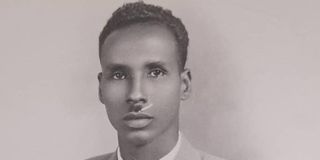Hersi Bulhan Farah: One of Somalia's last MPs voted in by the people dies

What you need to know:
- Bulhan, was elected MP in the last multiparty general election in Somalia in 1969 before army power takeover via a military coup.
- He was jailed alongside his fellow cabinet members for over 3 years and imprisoned on several occasions during the dictatorship of General Mohamed Siad Barre.
- He left the country and senior management jobs to join SSDF, the first rebel group formed outside Somalia to challenge the dictatorship in late 1970s.
- When Barre’s regime collapsed, he joined the efforts to establish Puntland as self-ruling authority in Northeastern regions of Somalia that signaled the first signs of Somalia becoming a federal state.
A member of Somalia’s last universal suffrage parliament has died, ending an era most Somalis remember with nostalgia.
Hersi Bulhan Farah (fondly known as Bulhan) died on Wednesday last week at an age presumed to be 100 years, having lived through Somalia’s chaos and survived much of its sate collapse.
Mr Bulhan’s death means there aren’t many of the politicians who won seats when Somalia last held a one-person-one-vote election. That type of election has eluded the country for 52 years.
Many people knew him because of his decades-long involvement in politics and administrative life in Horn of Africa country.
His political career rose when he was voted into the National Assembly (the 123-member parliament of the Somali Republic then) on 26th of March 1969. The election was a multiparty contest and he became MP for Eyl town, about 1,200 km northeast of the Somali capital Mogadishu.
According to who knew him then from Eyl district, Bulhan was preceded by Dahir Nur (elected in 1960) and Jama Aw Nurali (elected in 1964), all out of a contest involving various political parties.
Democracy
Somalia at the time was budding democracy and his election was also symbol for tolerance between parties. A month after the vote, in April 1969, then Somali President Abdirashid Ali Sharmarke reappointed Mohamed Ibrahim Egal as prime minister. In Egal’s new cabinet, Bulhan was appointed Minister of Agriculture.
But within six months, President Sharmarke was assassinated at Las Anod town, about 1030 km northwest of Mogadishu, during a tour on 15th of October 1969 by one of his bodyguards. Sharmarke’s body was transported to Mogadishu and buried on 20th of October, in line with Muslim rituals.
The foreign dignitaries who attended Sharmarke’s funeral included Zambia’s President Kenneth Kaunda and Kenya’s then Vice President Daniel arap Moi, who would later be the second President of his country.
Bulhan was among members of the central committee of the ruling party, the Somali Youth League (SYL) that met after the funeral services were concluded to discuss the replacement of the murdered president.
But, the democratically elected civilian politicians knew little then, that a group of army officers were planning to takeover power through a coup.
On October 21, 1969, 25 officers calling themselves the Supreme Revolutionary Council (SRC) led by Maj-Gen Mohamed Siad Barre, whisked Egal’s cabinet members including Bulhan into army buses and took them to a compound in Afgoye town, 30 km southwest of Mogadishu.
They remained in detention for over 3 years as the nationally endorsed constitution was abolished and the country led into a pseudo-socialist state and strict dictatorship.
In 1973, when the detained politicians were released, Bulhan was appointed Director of Plant Protection and Locust Control Department of the Ministry of Agriculture and later assumed the directorship of the state-run banana company.
Prior to becoming an MP, Bulhan had worked with state agencies, both before and after independence in the 1950s and 1960s, accumulating a wealth of public administration experience.
In late 1970s, when General Barre started consolidating his dictatorial power by forming a single party rule, a fully obedient legislative assembly and initiated a nationally-manipulated voting that crowned him as president in 1979, Bulhan left the country to join Somali Salvation Democratic Front (SSDF), the first rebel group that dared to confront Barre from abroad.
Central committee
Bulhan became a member of SSDF’s central committee, returning to Somalia when the rebel groups defeated the dictatorship, forcing Barre to flee, Mogadishu.
However, when the rebel militias turned their guns on each other, Bulhan retreated to the northeastern regions from where he hailed, eventually helping the formation of Puntland, one of the first self-ruled authorities in Somalia.
At the end of the 2-year Somali Reconciliation Conference at Mabagathi suburb, Nairobi, Kenya, Farah was selected to be the Interim Chairman of the Transitional Federal Parliament because he was identified as the oldest MP, a position he held until Sharif Hassan Sheikh Adan was elected speaker in September 2004.
He remained parliamentarian until August 2012 when he retired from politics, but remained active in the world of business and philanthropy.
Sadik Ahmed Bihi, a friend of Bulhan’s family, told Nation last week that the old man, though at an advantage age, expressed happiness that his home town, Eyl, alongside Qardho and Ufeyn, had become one of the three districts in Puntland, where people had exercised the first one-man, one-vote election in Somalia since March 1969.
Eight political groups, namely Kaah, Mideeye, Horseed, Caddaalad iyo Sinnaan, Runcad, Mustaqbal, Ifiye and Shaqaalaha, were registered to compete for 87 seats (municipal counselors). “
I am very pleased that over five decades ago, I was elected by one-man, one-vote, and my people in Eyl town, are repeating the experience,” Bihi quoted Bulhan’s expression on Friday over the phone from Qardho town in Puntland.
Visiting Kenya last week, Puntland President Said Abdullahi Deni sent his condolences to Bulhan’s relatives and Somalis across the world.
“Hersi Bulsan Farah was a giant who spent many years, serving the country and dedicated to the externalisation of our statehood,” said Deni.





